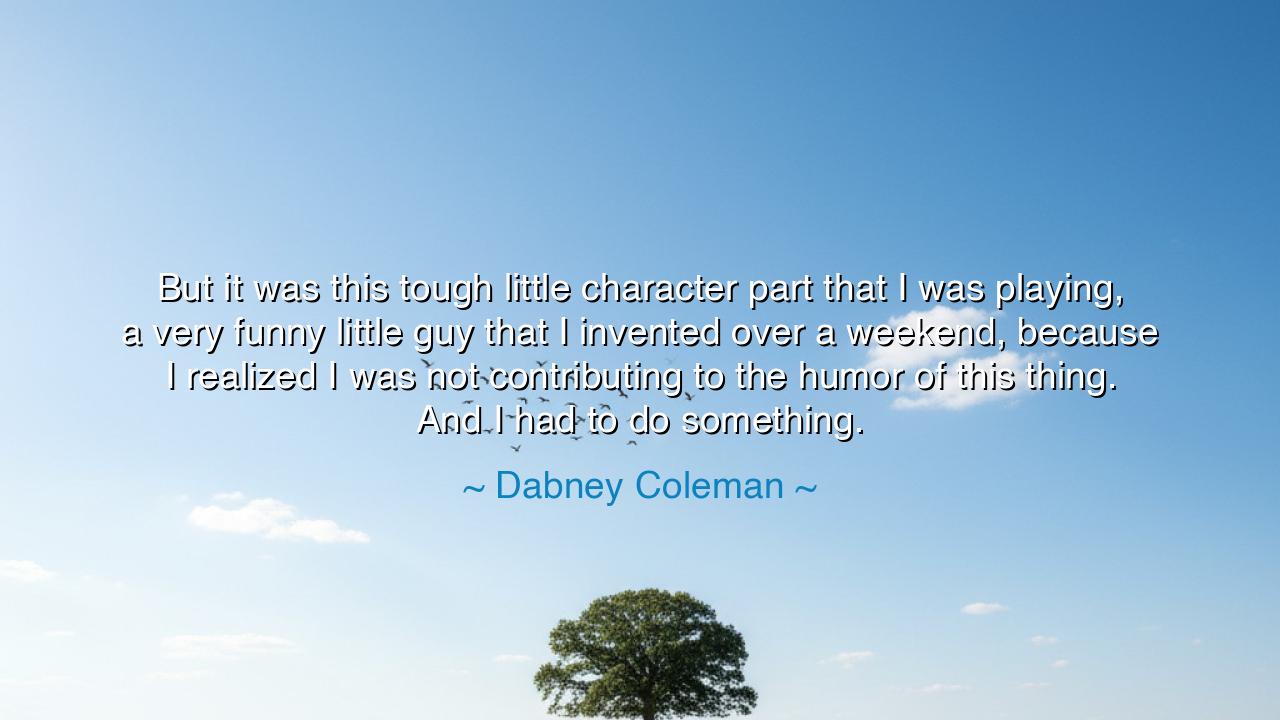
But it was this tough little character part that I was playing, a
But it was this tough little character part that I was playing, a very funny little guy that I invented over a weekend, because I realized I was not contributing to the humor of this thing. And I had to do something.






The actor Dabney Coleman, known for his sharp wit and masterful portrayals of flawed yet unforgettable characters, once said: “But it was this tough little character part that I was playing, a very funny little guy that I invented over a weekend, because I realized I was not contributing to the humor of this thing. And I had to do something.” These words, though rooted in the craft of acting, rise far beyond the stage and screen — they speak to the timeless struggle of every soul who seeks meaning in their work and the courage required to create one’s own value when none is given. In Coleman’s story lies a truth that burns brightly through the ages: when life offers no place for your light, you must carve one with your own hands.
When Coleman says he “had to do something,” he reveals a sacred urgency — the refusal to stand idle when the spirit knows it can give more. Many would have remained silent, content to be unnoticed, to pass through the performance without risk or failure. But Coleman, like all true artists, understood that to exist without expression is a kind of death. The act of inventing “a funny little guy over a weekend” was not mere improvisation — it was a moment of rebirth, the triumph of creativity over complacency. His humor became not just entertainment, but a declaration of selfhood. It was his way of saying, I am here, and I will matter.
This act of creation — quick, instinctive, born from necessity — echoes the eternal truth that art, and indeed life itself, often emerges from pressure. The ancient sculptor, given only a block of rough marble, must find within it the form that wishes to live. Coleman’s “tough little character” was such a form — born not from comfort, but from the tension between potential and limitation. In a single weekend, he did what all creators must do: he turned frustration into inspiration, silence into sound, and duty into art.
History offers many examples of this same spirit. Consider Leonardo da Vinci, who, when the Duke of Milan commissioned him to paint but failed to provide materials, began designing machines instead. Or Charlie Chaplin, who, faced with the dullness of early silent film, invented the “Little Tramp” — a character as humorous as he was heartbreaking, one that would forever change cinema. Like Coleman, they understood that the world seldom grants permission to create; one must seize the moment and define oneself. In the space between failure and invention lies greatness.
Coleman’s reflection also reveals the humility of the true artist. He admits, “I realized I was not contributing to the humor of this thing.” In this awareness, we see not defeat, but awakening. Many prideful souls cannot admit when their contribution falls short; fewer still have the courage to change course. But the wise know that growth begins in recognition. To be part of something greater — whether a play, a team, or a life’s purpose — one must listen to what is missing and offer it freely. Coleman did not seek glory; he sought balance, the harmony that occurs when each part fulfills its role.
Yet there is another layer of meaning — one that reaches into the heart of perseverance. The “funny little guy” Coleman invented is more than a character; he is the symbol of adaptability, of the human capacity to reinvent oneself again and again. When the path grows dim, when our talents feel unseen or unneeded, humor — or creativity in any form — becomes the light that leads us onward. The one who can laugh, who can still find joy in creation despite hardship, is the one who conquers despair. For as long as you can make something out of nothing, you are never truly defeated.
The lesson is clear and eternal: when life gives you no script, write your own. Do not wait for permission to contribute beauty, truth, or laughter. When you see that your gifts are unspoken, let them speak; when you feel unseen, become unforgettable. Like Dabney Coleman, trust the voice that whispers, Do something. For in that moment of daring, you transform not only your role, but yourself.
So remember, seekers of purpose and makers of light — the world will not always recognize your value at first glance. It may hand you a small part, a quiet space, or a single chance. But within that smallness lies infinite potential. Take it, shape it, and give it life. As Coleman did, turn the ordinary into the extraordinary. For in every act of creation, no matter how small, you declare the oldest truth of all: the human spirit was made not to stand still, but to shine.






AAdministratorAdministrator
Welcome, honored guests. Please leave a comment, we will respond soon